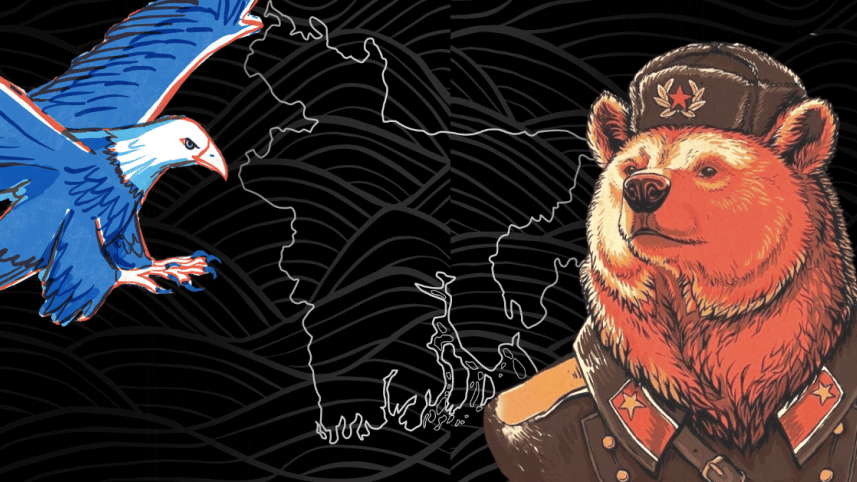Cold War redux in Dhaka

The dynamics of the US-Bangladesh and Russia-Bangladesh relations cannot be viewed outside the context of Bangladesh's increasing geopolitical, geostrategic, and geo-economic salience.
Bangladesh, with the second largest economy in South Asia and eighth largest population base, is currently the 35th largest economy in the world. Bangladesh's rapid socioeconomic development, its huge domestic market, its military-strategic significance for India and China, its role as a gateway between South and Southeast Asia, and its strategic location on the Bay of Bengal have all incentivised great powers, including the US and Russia, to seek expanded influence in the country. The US, motivated by the urge to retain its global hegemony through stalling the meteoric military economic rise of China, and guided by its Indo-Pacific Strategy, is currently bent on expanding its foothold in the Asia-Pacific region.
On the other hand, Russia, compelled by its growing estrangement from the West and its own geo-economic necessities, is seeking to engineer a pivot to Asia in general and the Asia-Pacific region in particular. Accordingly, Bangladesh has attracted both US and Russian attention.
The position is awkward and unenviable for Bangladesh because getting entangled in the Russia-US rivalry is contrary to Bangladesh's national interests. Moreover, the US is Bangladesh's third largest trading partner, the single largest market for exported RMG products, the topmost source of foreign direct investment, historically one of the largest providers of foreign aid, and the largest provider of aid for the Rohingya refugees. The US-Bangladesh relationship is therefore multifaceted, ranging from trade and investment to security and counter-terrorism.
Meanwhile, although the volume of Bangladesh's bilateral trade with Russia is relatively modest – worth USD 1.1 billion annually – Russia is currently the principal financier of some important projects in Bangladesh, including the 2,400 MW Rooppur Nuclear Power Plant, and is the fourth largest provider of foreign aid to Bangladesh, amounting USD 1.22 billion in 2022. Taking into account recent energy shortages in Bangladesh, Dhaka's energy cooperation with Moscow is critical to ensuring the former's energy security. More importantly, after China, Russia remains the second largest source of military equipment for the Bangladesh Armed Forces.
Needless to say, Dhaka has its own share of problems with both Washington and Moscow. A number of US activities – including the refusal to reinstate GSP facilities, the imposition of sanctions on Rab and its officials, the continued criticism of labour rights conditions, and the expression of dissatisfaction with internal politics – have irked Dhaka. Conversely, Washington is unhappy with Dhaka on account of a number of issues, including Bangladesh's close ties with China and Russia, and its internal political dynamics. However, Dhaka is less than satisfied with Russia's role in the Rohingya refugee crisis, as Russia has persistently supported Myanmar at the UN.
Taking into consideration the points of convergence and divergence between Dhaka and Washington as well as Dhaka and Moscow, it is in Dhaka's best interests to maintain friendly and cooperative relations with both of them. So far, Dhaka has aptly managed to strike a balance between the great powers, but the advent of the Ukraine crisis and consequent intensification of geopolitical rivalry has made the task far more challenging for Dhaka than ever before.
The war has adversely affected Bangladesh's economy. Moreover, Bangladesh has been compelled to walk on a politico-diplomatic tightrope since the start of the war. Bangladesh has so far refused to condemn Russia in clear terms for its invasion of Ukraine and abstained from voting on anti-Russian resolutions before the UN on a number of occasions.
On the other hand, Bangladesh has voted against Russia at the UNGA on a few occasions and has prevented the US-sanctioned Russian ship Ursa Major/Sparta III from docking at the Mongla seaport on December 24. However, Dhaka has sought to placate Moscow by receiving the goods from the ship via India, too. Moreover, the Russian Ambassador to Bangladesh, Aleksandr Mantytsky, has accused Bangladeshi media outlets of anti–Russian bias in their coverage of the Russia-Ukraine war.
However, both Washington and Moscow have responded to Dhaka's careful balancing act by increasing their diplomatic, economic, and military engagement with Bangladesh. For instance, the Exercise Tiger Lightning-3 between the armies was held in March 2022, the eighth US-Bangladesh Partnership Dialogue was held in Dhaka on March 20, 2022, the eighth US-Bangladesh Security Dialogue was held in Washington on April 4, 2022, and the second Joint Combined Exchange Training (JCET) between Bangladesh and the US naval special forces was held in October-November 2022.
More recently, the visits of US assistant secretary of state for population, refugees and migration, Julieta Valls Noyes, that of the US National Security Council official, Rear Admiral Eileen Laubacher, and the recent visit of US Assistant Secretary of State for South and Central Asian Affairs, Donald Lu, manifest renewed diplomatic engagement and the growing importance of US-Bangladesh ties. Meanwhile, Russian engineers and specialists continue work on the construction of the Rooppur NPP. Russia has also offered to sell oil to Bangladesh at discounted prices, although the offer was not accepted.
In a nutshell, Washington's controversial interference in domestic politics and Moscow's equally controversial criticism are both unwelcome developments for Dhaka.
The recent activities of Washington and Moscow are indicative of the fact that Bangladesh, against its will, is being turned into a potential battleground for influence between the two top nuclear powers. Thus, Bangladesh must navigate carefully amid these murky geopolitical waters.
HA Shovon is a senior research associate at Central Foundation for International and Strategic Studies. Md Himel Rahman is a research intern at KRF Center for Bangladesh and Global Affairs.



 For all latest news, follow The Daily Star's Google News channel.
For all latest news, follow The Daily Star's Google News channel.
Comments